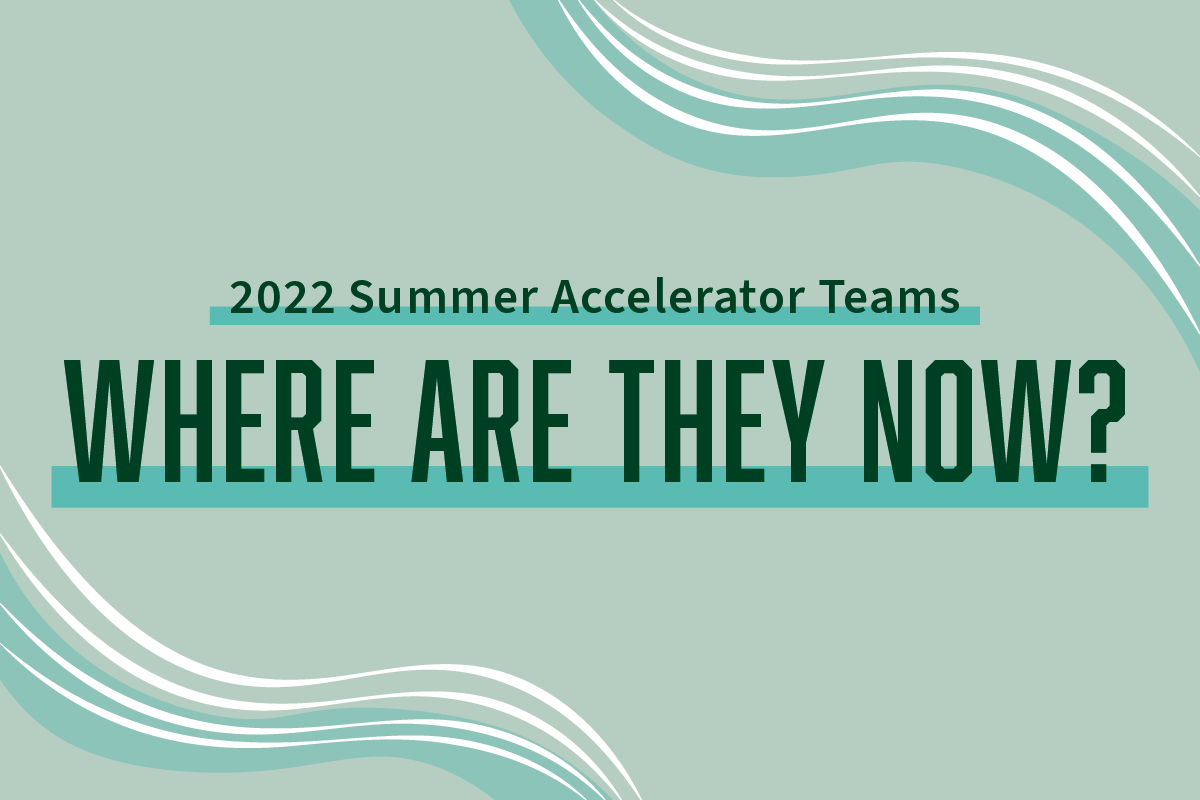It’s been more than six months since the 2022 Cal Poly Center for Innovation and Entrepreneurship (CIE) Summer Accelerator came to an end. During the Accelerator, Cal Poly students and recent graduates spent 13 weeks immersed in the startup process, turning their startup ideas into real, viable businesses.
The program culminated in Demo Day, where the participating teams showcased the progress they made on their startups throughout the summer and pitched their companies.
Since Demo Day, the 2022 Summer Accelerator cohort have embarked on new professional, educational and — of course — entrepreneurial endeavors.
Here’s a team-by-team breakdown of what the cohort is up to now:
Castle Innovations LLC | Cheekies | Quickie | Ryde | Venture Rent | X-Adapt
Castle Innovations (Formerly known as Grip Safe)
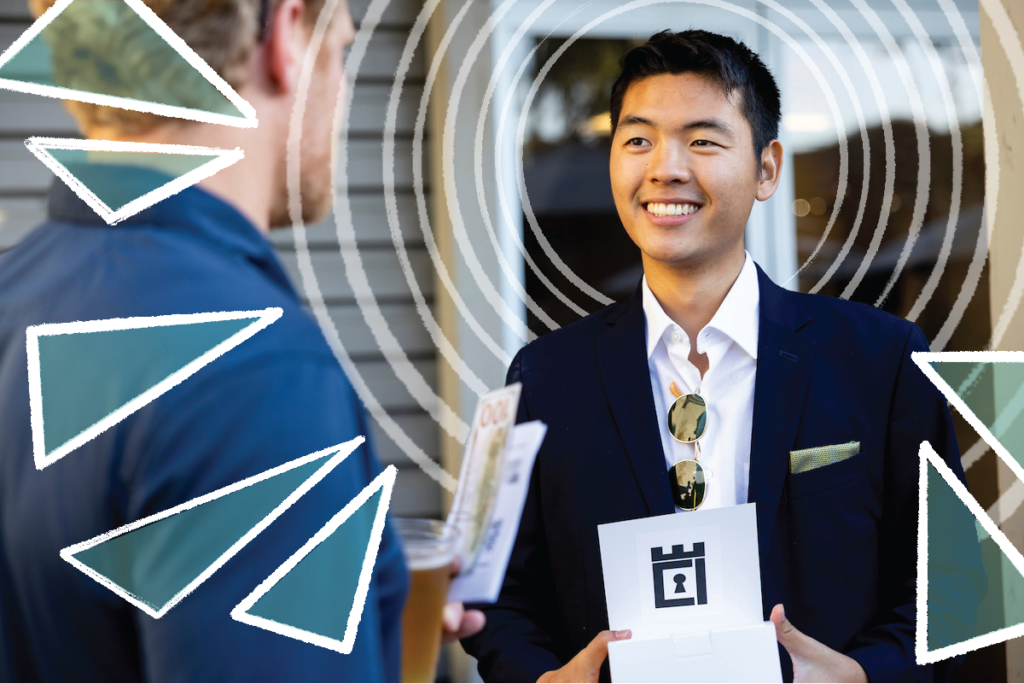
Castle Innovations LLC founder Shaun Tanaka. Graphic by Sarah Hirst.
Castle Innovations LLC founder Shaun Tanaka entered the Summer Accelerator with an idea to save lives: a patented firearm safety device for AR-15s called GripSafe.
Tanaka said he and his team conducted extensive customer development during the Summer Accelerator. They produced multiple iterations of the product, each one improving upon its predecessor.
“While our mission never changed, our product changed drastically,” Tanaka said.
Their current iteration, called the CastleLock, uses high-speed biometric locking technology to secure AR-15s from unwanted users and negligent discharges.
Tanaka said he has “dove head first” into the startup process since Demo Day. He was able to secure a round of angel investment, which allowed him to hire mechanical engineers from a design firm and expand the company team. Castle Innovations LLC now has 16 total team members.
“Without the Summer Accelerator, so much of the company wouldn’t have happened,” Tanaka said. “With the help of the CIE, we were able to get angel investment, mentorship, resources, and access to engineering shops that we otherwise would not have had access to.”
Shortly after Demo Day, Tanaka began pursuing his Masters in Public Policy at Cal Poly. He said he has been leveraging his graduate education to best benefit his startup.
“I found myself tailoring my Masters program to my startup,” Tanaka said. “Being in the Masters of Public Policy program, it’s helped me navigate the complexities of firearm legislation, which is currently helping progress the business.”
Dylan Defazio, who worked for Castle Innovations LLC as an independent contractor during the Summer Accelerator, also returned to Cal Poly after Demo Day as a mechanical engineering junior.
Defazio said he picked up several tips and tricks throughout the Summer Accelerator that have helped him as he pursues his degree. Organizational tools like Notion, an online note taking application, and communication techniques he learned through the program have been especially helpful, he said.
Although Defazio is no longer working with Castle Innovations LLC, he has remained involved with the CIE. He is mentoring students who are interested in applying to the Summer Accelerator, as well as helping students prepare for Innovation Quest (iQ), an innovation competition that Defazio and Tanaka won third place in in 2022.
Defazio took notes — on Notion, of course — throughout the Summer Accelerator program. He uses those notes to inform his advice to fellow student entrepreneurs.
He met most of his mentees through the Hatchery, the CIE’s on-campus startup incubator — the same program through which he met Tanaka.
“Seeing a lot of new ideas come through the Hatchery was awesome,” Defazio said. “That’s why I love mentoring — because you’re around the Hatchery. I just love the spirit of entrepreneurship.”
Cheekies

Cheekies co-founders McCall Brinskele (left) and Mariana Inofuentes (right). Graphic by Sarah Hirst.
McCall Brinskele, founder of Cheekies, set out to help menstruators sleep comfortably while on their periods by inventing a period sleep short that uses leak-proof technology.
Brinskele, a biomedical engineering major, had minimal business or entrepreneurship experience when entering the Summer Accelerator, but quickly adapted to the startup process.
Throughout the course of the summer, Brinskele became adept at the “business side” of the startup process learning entrepreneurial skills like customer development and, of course, pitching.
“Pitching every single week, I definitely became more confident speaking in front of investors,” she said.
Brinskele said she and co-founder Mariana Inofuentes were “pumped” for Demo Day.
“I mean, as you can see in the video (of our pitch), we were having so much fun on that stage,” Brinskele said. “I was really eager to keep going. It was nice to get that recognition for all the work that we had done, and it was very motivating to know that what we were doing was going to make a difference in people’s lives.”
Since Demo Day, Brinskele has continued to work on Cheekies and is currently gearing up for a pivot. She has not disclosed the details of the pivot, but said that she is currently in the customer development stages.
“(We are) making sure that we’re making a product that’s really going to meet needs and change lives since that was the goal from the beginning,” she said.
Brinskele is also pursuing her Masters in Engineering Management at Cal Poly. Participating in the Summer Accelerator “gave (her) an edge” in her Masters classes, she said.
She is currently working on Cheekies’ pivot as a project for her Masters program.
Brinskele said the Summer Accelerator helped her build the skills needed to tackle the pivot. The program also provided validation that Cheekies, which started as a passion project, has the potential to not only sell, but to change people’s lives for the better.
“Getting that encouragement from the Accelerator, as well as all of the training,” Brinskele said. “I don’t think I would be able to pivot right now if I didn’t have all those tools.”
Quickie

Quickie co-founders Matt Menno (left) and Will Tregenza (right). Graphic by Sarah Hirst.
Business administration majors Matt Menno and William Tregenza entered the Summer Accelerator to further develop their startup Quickie, a quick and affordable delivery service for college students that soft-launched in November of 2021.
“We thought we knew a lot about the business that we were making because we’d already been at it for a few months, but after making it through the Accelerator, we were not even close to experts on Quickie,” Tregenza said.
Menno spent the summer developing a mobile application for Quickie, while Tregenza focused on marketing — and pitching.
Tregenza said the Summer Accelerator helped him grow comfortable with public speaking.
When the co-founders debuted their startup at the CIE’s May Entrepreneurship Forum before the Summer Accelerator began, Tregenza said he “paused on stage.”
“I literally just got shocked on stage,” Tregenza said. “Then, by the end of the Accelerator (at Demo Day), I was up there doing an eight minute pitch, easy.”
Since Demo Day, Quickie has grown significantly. Their mobile application has reduced customer check-out times from five minutes to roughly 20 seconds.
Menno said CIE Director of Finance and Operations Damon Watkins recommended Quickie grow their team, telling Menno and Tregenza, “You need time to actually grow the business, whereas right now you guys are running it.”
They now have 12 employees who deliver orders, as well as an app developer and a marketing manager.
Quickie delivers to addresses within a two-mile radius of the Cal Poly campus. They recently acquired a storefront in the middle of that radius, which Menno said has helped Quickie “capitalize on (their) delivery speeds.”
Tregenza and Menno said they plan to expand to another campus within the next year — and use the skills they developed in the Summer Accelerator along the way.
“The skills you learn — the networking, the deep dive you take into your business model — all of that stuff has prepared us to analyze competitors and standardize our model here so that we can copy and paste it at other campuses,” Tregenza said.
Ryde
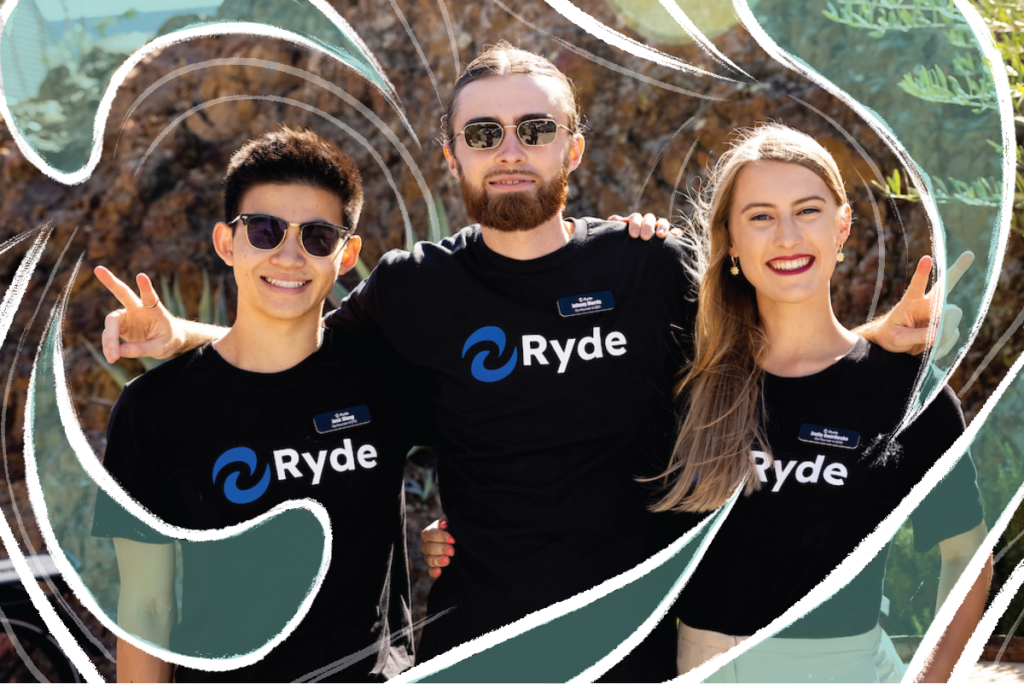
Ryde co-founders (from left to right) Josh Wong, Johnny Morris and Emily Gavrilenko. Graphic by Sarah Hirst.
Three co-founders joined the Summer Accelerator with their startup Ryde, a travel marketplace connecting college student riders with college student drivers for long-distance travel.
The Summer Accelerator provided the resources to grow Ryde from a student project to a real, scalable business, co-founder and Head of Customer Experience Johnny Morris said.
Ryde officially launched in October 2022. Since then, more than 3,500 Cal Poly students have signed up for the app. Ryde has facilitated more than 1,600 rides and helped students travel more than 450,000 miles.
“We’re getting so much natural growth just through students telling each other because they love it so much and they had a good experience,” said Ryde co-founder and CTO Josh Wong. “I think that’s the most valuable sign of success.”
The startup also recently won $25,000 in funding at the Sunstone Cal State University (CSU) Startup Launch Competition, an annual pitch competition for CSU students and recent graduates. Competing teams are divided into three categories, including product, service and social enterprise. Ryde won the service track’s first-place prize.
All three co-founders are still working on Ryde — and embarking on their own professional endeavors.
Wong is now in Houston, Texas working for NASA as a software engineering intern. At NASA, he is able to exercise his entrepreneurship knowledge almost as often as his software engineering skills.
“I hear methods of entrepreneurship — like building a minimally viable product,” Wong said. “I wouldn’t have known anything about that before the Accelerator.”
Morris graduated in June 2022, shortly before the Summer Accelerator began. Since the Accelerator, he has been working full-time on Ryde, as well as working part-time for another Accelerator alum, Quickie.
Morris said that, after having worked alongside Quickie during the Accelerator — not to mention running a startup himself — he is able to “bring something kind of unique to the table” and can “think more process-oriented, more strategically” about Quickie, he said.
Ryde co-founder and CEO Emily Gavrilenko also found an additional job through the Summer Accelerator.
Gavrilenko met an industry professional during the networking portion of Demo Day whose company was hiring. The connection eventually led to her current role as a product manager.
“I got the contact at Demo Day, and now I have a super sweet job,” Gavrilenko said.
Despite their separate professional endeavors, the Ryde co-founders will continue to work together and leverage the skills they build in the Summer Accelerator to grow their startup. They said they intend to expand beyond Cal Poly, to other college campuses in California, over the next six months.
“We’ve done so much more in the past six months than we did in the first six months,” Gavrilenko said. “After the first six months, we had a super scrappy MVP out there. We hadn’t made a single dime. We’d done maybe 30 rides. No one really knew about us. Now, seeing how far we’ve come, it’s incredible.”
Venture Rent
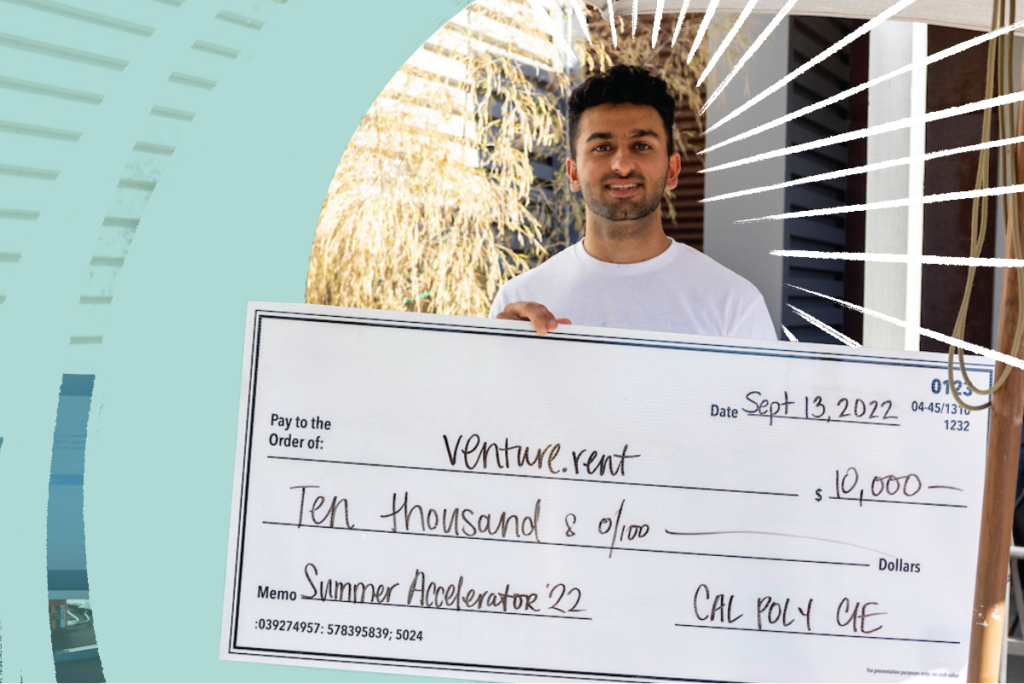
Venture Rent founder Shubh Khandhadia. Graphic by Sarah Hirst.
Business administration major Shubh Khandhadia entered the Summer Accelerator as the co-founder of Venture Rent, a startup developing a mobile application that allows users to quickly and easily rent outdoor equipment, such as kayaks and surfboards.
Two weeks into the Summer Accelerator, Khandhadia’s co-founder stepped down, and he quickly found himself promoted to CEO. Khandhadia, who also has a minor in computer science, leveraged the information he had learned in a Summer Accelerator workshop about software and technology in order to quickly develop a minimally viable product (MVP).
Developing the MVP allowed Khandhadia to focus on running the business, while his team of software developers continued to work on the product.
“This was my first experience in a startup, leading a team of developers and working with them every week,” Khandhadia said. “I learned throughout the Accelerator how to be an effective leader, how to work well with others and how to find people who compliment you.”
Khandhadia said Demo Day was a rewarding experience and an opportunity to celebrate all he had accomplished over the course of the Summer Accelerator.
Khandhadia compared the Summer Accelerator to studying, and Demo Day to a test.
“For me, leading up to the exam is the most stress. The exam is never stress because at that point, you’re just showing what you know,” Khandhadia said. “So for me, pitching (at Demo Day) wasn’t that bad — it was actually a really fun experience.”
Shortly after Demo Day, Khandhadia wrote down a list of goals for Venture Rent and a list of personal goals. After careful consideration, he decided to take a break from Venture Rent in order to focus on career development.
He decided to apply to graduate school — not for business, but for computer science (CS).
“I’d always wanted to go into computer science,” Khandhadia said. “I switched my major twice. I started in business, went to CS, went back to business, then tried to get back into CS but couldn’t. So I decided I would do a Masters in CS.”
Khandhadia was recently accepted into the University of Southern California (USC) graduate program. He will be studying computer science with a specialization in artificial intelligence (AI).
“My goal was to pair up my business degree with a more technical degree,” Khandhadia said. “Honestly, the startup experience was huge in motivating me to do that because I got to see the importance and value behind being an engineer.”
X-Adapt
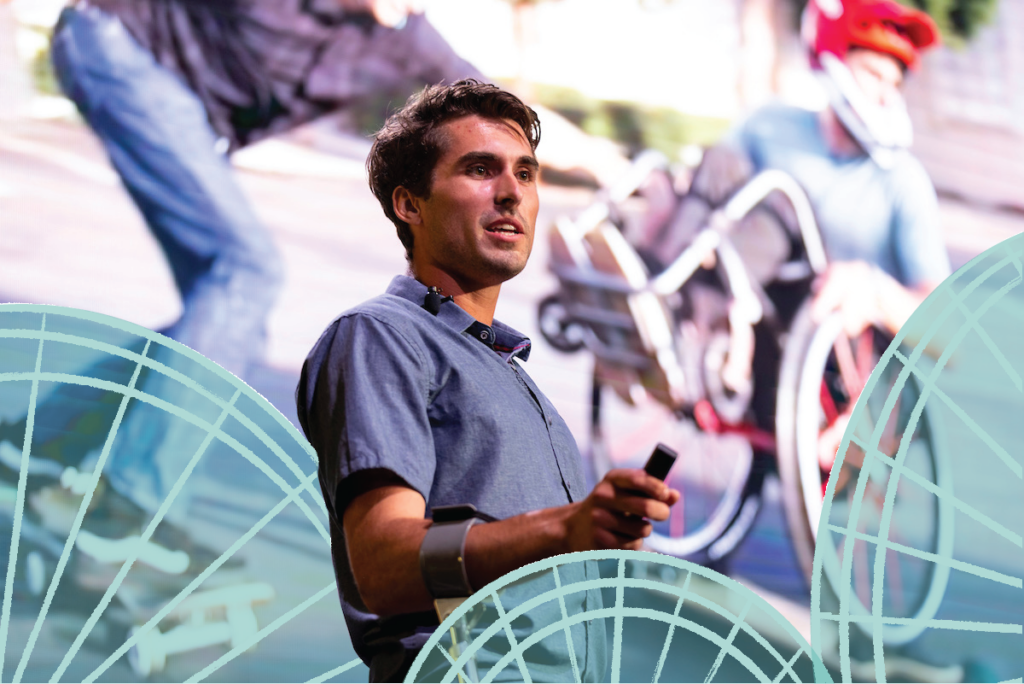
X-Adapt founder Evan Lalanne. Graphic by Sarah Hirst.
Evan Lalanne entered the Summer Accelerator fresh off of a win at iQ. Lalanne won the first-place prize of $15,000 with his startup Adapted Mobility, now known as X-Adapt.
X-Adapt is a startup working to make “the world more accessible for people with disabilities,” according to Lalanne.
Lalanne’s iQ pitch — and later, his Demo Day pitch — was for a device that modifies commercially available electric unicycles to allow for use by adaptive riders in place of a wheelchair.
The device has greater mobility and capability than most wheelchairs, which allows riders to access environments with tougher terrain, like hiking trails. It is also compact, making it easier for riders to navigate crowded spaces, like bars or parties. The self-balancing feature in the electric unicycle even allows riders to climb up and down stairs — as Lalanne demonstrated at Demo Day during his pitch.
During the Summer Accelerator, Lalanne focused on product development. He also used Accelerator resources to grow his network.
“The best part of the program is definitely the network that you build,” Lalanne said. “You get connected with so many different mentors and people with varying backgrounds that are all motivated to help you out, and that’s huge.”
Since the Summer Accelerator, Lalanne has set up internal product development and prototyping equipment and is now finalizing his first customer-facing MVP’s.
He recently competed at the Sunstone CSU Startup Launch Competition, where X-Adapt won the product track’s second-place prize of $10,000.
Lalanne said he is planning to have early adopters provide feedback on the MVP’s during the second half of 2023 and is targeting early 2024 for early commercial sales.
It’s now been more than six months since these student-led startups completed the Summer Accelerator program — but in less than two months, a whole new cohort of promising entrepreneurs will set out on their own startup ventures.
Meet the 2023 Summer Accelerator teams at this year’s May Entrepreneurship Forum, May 16 at 4:30 p.m. in the Cal Poly Performing Arts Center.
Tickets available for free here!
